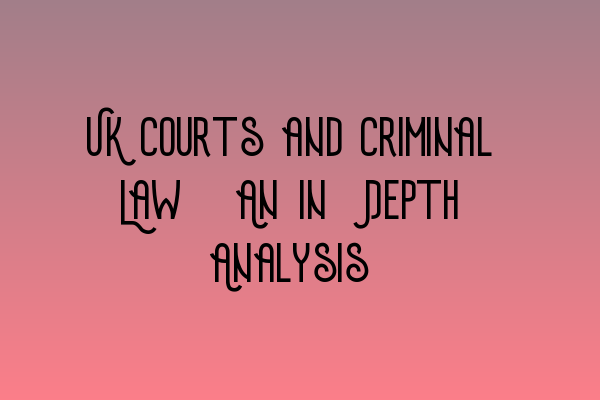UK Courts and Criminal Law: An In-Depth Analysis
Welcome to SQE Criminal Law & Practice Law UK, where we provide comprehensive insights into the UK court system and criminal law proceedings. Whether you’re a law student, legal professional, or simply curious about the intricacies of the criminal justice system, this article will offer you an in-depth analysis of the subject matter.
The Structure of UK Courts
The UK court system is hierarchically organized, allowing for the fair administration of justice across different levels. This hierarchal structure includes:
- Magistrates’ Courts
- Crown Courts
- The Court of Appeal
- The Supreme Court
Each court has its specific jurisdiction and responsibilities within the criminal justice system. Understanding the role and function of each court is crucial in comprehending the progression of a criminal case from start to finish.
The Criminal Law Process
The criminal law process in the UK involves a series of steps, ensuring that justice is served and individuals accused of criminal offenses are given fair trials. Let’s take a closer look at each stage:
- Investigation: This initial stage involves the collection of evidence by law enforcement agencies to ascertain whether a crime has been committed.
- Arrest: If sufficient evidence exists, the suspect is arrested and informed of their rights.
- Charge: The suspect is formally charged with the alleged offense and brought before a court.
- Arraignment: At this stage, the accused enters a plea of guilty or not guilty.
- Trial: The trial takes place in either a Magistrates’ Court or a Crown Court, depending on the severity of the offense.
- Verdict: After hearing all the evidence, a verdict is reached by a judge or a jury.
- Sentencing: If the accused is found guilty, they will be sentenced according to the law.
- Appeals: The convicted individual has the right to appeal their conviction or sentence to a higher court.
Importance of Legal Representation
In any criminal case, legal representation is crucial to ensure fair and just proceedings. Legal professionals, including solicitors and barristers, play a significant role in advising clients, gathering evidence, and presenting arguments in court.
At SQE Criminal Law & Practice Law UK, we understand the importance of effective legal representation. Our team of experienced solicitors and barristers is committed to providing high-quality legal services and ensuring the rights of our clients are upheld.
Preparing for SQE Exams
If you’re a law student aspiring to become a solicitor, it’s essential to be well-prepared for the SQE exams. We offer comprehensive SQE 1 and SQE 2 preparation courses to help you succeed in your legal career.
For SQE 1 exam practice, check out our SQE 1 Practice Exam Questions and SQE 1 Practice Mocks FLK1 FLK2 articles. These resources will aid in enhancing your legal knowledge and improving exam performance.
Similarly, if you’re preparing for the SQE 2 exams, our SQE 2 Preparation Courses will equip you with the necessary skills and knowledge to excel in your assessments.
Stay Updated with SRA SQE Exam Dates
Being aware of the SRA SQE exam dates is vital for effective exam preparation. Stay up to date with the latest exam schedules by referring to our SRA SQE Exam Dates article. This resource will ensure that you’re well-informed and adequately prepared for your exams.
Thank you for reading our comprehensive analysis of UK courts and criminal law. We hope this article has provided you with valuable insights into the criminal justice system and the importance of legal representation. For more information and expert legal services, feel free to contact SQE Criminal Law & Practice Law UK.
